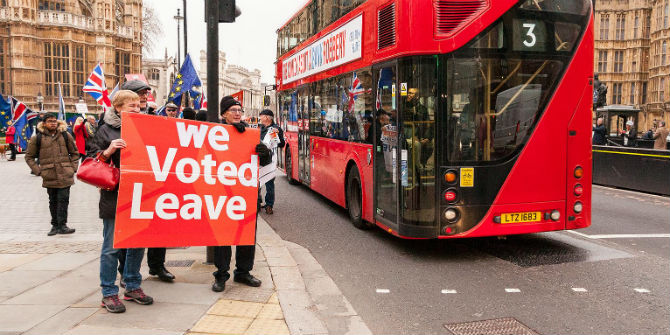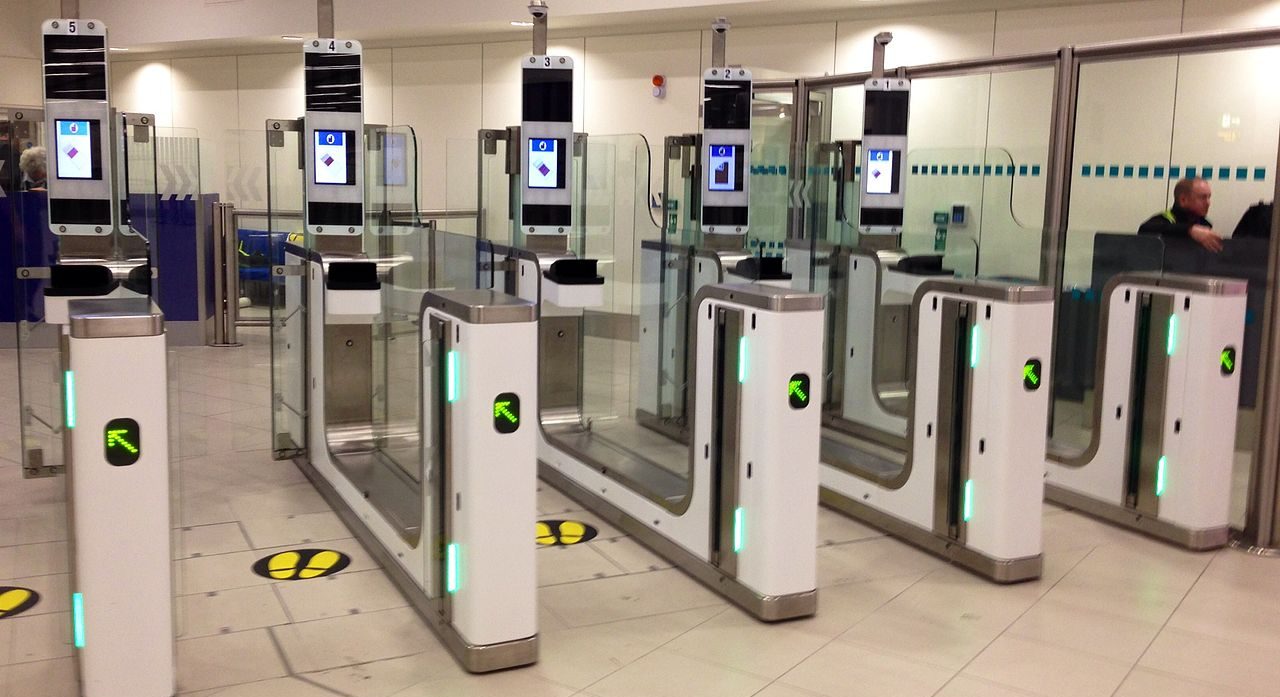 What will a no-deal Brexit mean for road transport? Dmitry Grozoubinski explains that come March 30th 2019, UK firms may not be able to transport goods between European Union countries. This means that many British lorry drivers will not be able to work in the EU, and many UK firms will urgently need to become permanently established somewhere in the EU to operate across Europe. This, in turn, will have a knock-on effect on the many UK businesses which rely on road transport for their supply chains, and those who supply businesses who do so.
What will a no-deal Brexit mean for road transport? Dmitry Grozoubinski explains that come March 30th 2019, UK firms may not be able to transport goods between European Union countries. This means that many British lorry drivers will not be able to work in the EU, and many UK firms will urgently need to become permanently established somewhere in the EU to operate across Europe. This, in turn, will have a knock-on effect on the many UK businesses which rely on road transport for their supply chains, and those who supply businesses who do so.
UK registered vehicles moved 7.8 million tonnes of goods into and out of the United Kingdom in 2016. Unless something changes between now and March 29, the EU will cease treating UK logistics firms, transport professionals and drivers as EU members. This could disrupt their operations and that of businesses which rely on smooth road transport between the UK and the EU. What we know about the planned changes comes from the EU Commission’s Article 50 Preparedness Notices. Unless a deal is reached or the EU issues new notices, these are the rules the EU has formally advised it will apply.
 Image by Glen Wallace (CC BY-SA 2.0).
Image by Glen Wallace (CC BY-SA 2.0).
What are some of the major changes?
UK firms may not be able to transport goods between European Union countries. To provide cargo road transport services between EU countries or entirely within one EU country, a firm requires a ‘Community Licence’ issued by an EU Member State. On Brexit Day 1, Community Licences issued by the UK will not be accepted by the EU. Moreover, Community Licences are issued only to firms registered in the country issuing the licence, so UK firms may not be able to obtain a new licence unless they re-establish within the EU-27. There is a system of permits which allows a limited amount of truck drivers from certain countries without a Community Licence to enter the EU every year. For the UK, that limit is 1,224 permits annually. For reference, 500 trucks cross into the EU from the UK daily.
Those with only UK Certificates of Professional Competence will not be able to work in the EU. To work as a driver, road transport operator or transport manager, in the EU an employee needs a Certificate of Professional Competence. On Brexit Day 1, the EU will no longer accept Certificates of Professional Competence issued by the UK’s Department of Transport or anyone it authorises to issue such a certificate. If a worker is employed in one of the above professions and has a Certificate of Professional Competence only from the UK, they will not be able to work in the EU.
All UK drivers in the EU will need driver attestations from the EU member their firm is based in. If an EU firm employs drivers who are not EU permanent residents, they have to apply for and receive a ‘Driver Attestation’ from the EU country their firm is registered in. On Brexit Day 1, drivers living in the United Kingdom will require such attestations, and the UK will not be authorised to issue them. Without such an attestation, a driver will not be able to work in the EU.
UK firms will need a ‘Permanent Establishment’ within the EU to operate. To operate a freight business in the EU, a firm needs to have a ‘Permanent Establishment’ in an EU Member State. On Brexit Day 1, freight and logistics firms whose ‘Permanent Establishment’ is in the UK will not be allowed to deliver goods within the EU.
Why are these changes happening?
If Brexit occurs with no deal or bridging arrangements in place, the EU will begin treating the United Kingdom in the exact same manner as it does a World Trade Organisation Member with which it has no additional agreements in place whatsoever. The requirements described above are those the EU applies to drivers and firms from such Members.
Will the EU really go through with enforcing these rules? That’s difficult to predict. The Preparatory Notices are official documents and the EU has not formally indicated it plans to unilaterally back away from their contents. Even a temporary decision by the EU not to actively enforce these measures would not necessarily solve the problem. A driver operating in contravention of EU licensing rules, for example, would potentially be voiding their vehicles insurance, even if the EU itself is not actively enforcing the rules. Most logistics firms will hesitate before allowing an uninsured truck on the road.
Could a deal still be reached to avoid this scenario? A deal covering the entire UK-EU trade relationship or a smaller agreement specifically on aspects of the above could still be forged in time for Brexit. However, market access for road transport is a highly sensitive area for the European Union and so the possibility of Brexit occurring without a fix in place must be taken seriously.
What can business do to prepare?
Whether you are in the road transport sector or rely on its smooth operation for your business, it’s worth familiarising yourself closely with the Preparatory Notice. A number of the certifications which may be required post-Brexit take time to acquire and should all this transpire, a flood of applications could overwhelm relevant authorities. Consider whether taking steps now is a good investment. Beyond that, carefully consider the resilience of your business to short-term disruption in the road transport sector.
This post represents the views of the author and not those of the Brexit blog, nor the LSE.
Dmitry Grozoubinski is a former Australian trade negotiator, including at the World Trade Organisation, working at the International Centre for Trade and Sustainable Development. He explains trade accessibly at http://explaintrade.com.







Presumably the UK would enact exactly similar regulations governing road transport by foreign operators. No more Dutch, Romanian or Polish Lorries, no more Mr Dentressangle, how many EU trucks are to be found in UK compared with British lorries in Europe?
Of course there will be a new equilibrium. I don’t think anybody is disputing that. However do you really want to adapt overnight with the potential for massive disruptions for people’s livelihoods and the UK supply chain?
It’s not a case of enacting “exactly similar regulations governing road transport” but a lack of them if the UK leaves without and agreement. For the UK to insist that non-UK drivers and vehicles are no longer allowed would, at best, simply reinforce the sudden loss of UK credentials (in every professional field, incidentally) and therefore the UK’s unique isolation from the rest of the world as well as ensure that the UK can no longer import as well as export. Ruinous.
This is just more of the same sort of scaremongering nonsense we have been subject to since we voted to leave the EU. It is in no ones interest for this scenario to unfold and if it did then the ramifications of it would be felt right across Europe.
It is in the EUs interest as much as it is ours, that when we leave trade and cooperation between us continues as seamlessly as possible. If it doesn’t then we should withdraw our cooperation on defence, crime etc and see how the EU copes with going it alone on all fronts.
Tricky, the UK has opted out of seamless trade and chosen to renegotiate trade rules. The EU is bound by a set of established legal rules that define the EU, so have constraints in what they can offer the UK. The EU has some interest in seamless trade with the UK and it also has an interest in maintaining the EU as an entity, so will have to balance the two interests.
At Karl – “..and see how the EU copes with going it alone on all fronts”
Jeez – I’m sure all 28 (soon to be 27) member states will be quivering in their boots! Wow – Karl are you living in the 18th Century with your pals J.Reese Mogg and Blowjob Johnson? The Empire ended a while ago son – the UK’s just a wart on the backside of our European neighbours…they’ll be happy to see the back of us.
Wake up.
The stats say that in 2017 345,000 UK lorries used EU continental roads. 2 million EU lorries used UK roads.
Who has the bigger problem?
People peddling 15% of the problem without though to the other side of the argument really need to have a good think.
Do as the swiss do for foreign trucks entering switzerland . 1 full years roadtax payable in advance before entering or using the uk roads. Not refundable, not transferable. No long range fuel tanks permitted (accident/fire risk) on foreign trucks, therefore having to buy fuel in the uk and pay uk duty on it. If they want to play hardball, so can we.
No more European lorries in the UK ?Let’s see who will be starving…
I assume it will those that they are delivering to in the UK and who will either not receive their goods from Europe, or pay more them.
The details of this “problem” have been known for quite a while now, but whenever they have been raised, they meet with the same combination of incredulity and bombast about how it would hurt them more than it hurts us, the same misunderstanding of statistics (345,000 UK lorries used EU continental roads. 2 million EU lorries used UK roads) and the same idea that the EU is “punishing” the UK for leaving.
These rules about “third country” participation in road transport in the EU exist now and apply to all third countries. The UK has decided to leave the EU and if the UK chooses to do so in a way that makes it a third country, then the pre-existing rues will all apply.
This is what most leavers signed up for. No good crying about it now.
Agree. The UK knew before it involved Article 50 how a third country is treated, and it chose to go ahead anyway. The government ignored their internal disagreements on the UK goals for Brexit, increasing the likelihood of a failure to come to agreement with the EU. Seems like a case self-inflicted pain to me.
How will the EU be able to deliver their £100billion trade surplus to the UK?
You also fail to mention that most trucks leave the UK empty.
The biggest problem will be for the EU if British trucks can’t drive in Europe (really what utter nonsense). So they issue quotas. This will be GREAT for the UK transport industry because more trade will be forced to use UK trucks.
Basically this government is weak and divided and will not carry out the result of the referendum. Upon leaving without a deal we trade under WTO rules. The EU cannot punish us in a way that everyone thinks as whatever happens to one country under WTO has to happen to all members no single country can be punished or singled out. Look at those within the WTO and you will see continued growth.
In some ways initially there will be problems for everyone involved though in time as with most things they will sort themselves out. In the meanwhile a clean break from the EU means we are free to trade with anyone else in the world and being 1 on 1 instead of 27 on 1 deals will be made more quickly.
Project Fear works because the media and those in power who did not like the referendum result are getting the headlines.Those favouring Brexit are just given the negative narrative. Upon these Government adopting more blue sky thinking, this country could become so much better than it is now and for the betterment of all
Actually countries can be punished under WTO rules. If the UK falls back on WTO rules it gives up sovereignty to the WTO dispute resolution system which can force a nation to change its laws.
Currently 5,000 (NOT 500) lorries leave Dover DAILY bound for Europe. It is not the only port.